#Marion Turner
Text
This is why we still need Women’s History Month.
By Martha Gill
What was life like for women in medieval times? “Awful” is the vague if definite answer that tends to spring to mind – but this is an assumption, and authors have been tackling it with new vigour.
The Once and Future Sex: Going Medieval on Women’s Roles in Society by Eleanor Janega, and The Wife of Bath: A Biography by Marion Turner both contend that women were not only bawdier but busier than we thought: they were brewers, blacksmiths, court poets, teachers, merchants, and master craftsmen, and they owned land too. A woman’s dowry, Janega writes, was often accompanied with firm instructions that property stay with her, regardless of what her husband wanted.
This feels like a new discovery. It isn’t, of course. Chaucer depicted many such cheerfully domineering women. The vellum letter-books of the City of London, in which the doings of the capital from 1275 to 1509 were scribbled, detail female barbers, apothecaries, armourers, shipwrights and tailors as a matter of course. While it is true that aristocratic women were considered drastically inferior to their male equivalents – traded as property and kept as ornaments – women of the lower orders lived, relatively, in a sort of rough and ready empowerment.
It was the Renaissance that vastly rolled back the rights of women. As economic power shifted, the emerging middle classes began aping their betters. They confined their women to the home, putting them at the financial mercy of men. Female religious power also dwindled. In the 13th century seeing visions and hearing voices might get a woman sainted; a hundred years later she’d more likely be burned at the stake.
“When it comes to the history of gender relations, storytellers portray women as more oppressed than they actually were”
Why does this feel like new information? Much of what we think we know about medieval times was invented by the Victorians, who had an artistic obsession with the period, and through poetry and endless retellings of the myth of King Arthur managed somehow to permanently infuse their own sexual politics into it. (Victorian women were in many respects more socially repressed than their 12th-century forebears.)
But modern storytellers are also guilty of sexist revisionism. We endlessly retread the lives of oppressed noblewomen, and ignore their secretly empowered lower-order sisters. Where poorer women are mentioned, glancingly, they are pitied as prostitutes or rape victims. Even writers who seem desperate for a “feminist take” on the period tend to ignore the angle staring them right in the face. In her 2022 cinematic romp, Catherine called Birdy, for example, Lena Dunham puts Sylvia Pankhurst-esque speeches into the mouth of her 13th-century protagonist, while portraying her impending marriage – at 14 – as normal for the period. (In fact the average 13th-century woman got married somewhere between the ages of 22 and 25.)
But we cling tight to these ideas. It is often those who push back against them who get accused of “historical revisionism”. This applies particularly to the fantasy genre, which aside from the odd preternaturally “feisty” female character, tends to portray the period as, well, a misogynistic fantasy. The Game of Thrones author George RR Martin once defended the TV series’ burlesque maltreatment of women on the grounds of realism. “I wanted my books to be strongly grounded in history and to show what medieval society was like.” Oddly enough, this didn’t apply to female body hair (or the dragons).
This is interesting. Most of our historical biases tend to run in the other direction: we assume the past was like the present. But when it comes to the history of gender relations, the opposite is true: storytellers insist on portraying women as more oppressed than they actually were.
“The history of gender relations might be more accurately painted as a tug of war between the sexes”
The casual reader of history is left with the dim impression that between the Palaeolithic era and the 19th century women suffered a sort of dark age of oppression. This is assumed to have ended some time around the invention of the lightbulb, when the idea of “gender equality” sprang into our heads and right-thinking societies set about “discovering” female competencies: women – astonishingly – could do
things men could do!
In fact the history of gender relations might be more accurately painted as a tug of war between the sexes, with women sometimes gaining and sometimes losing power – and the stronger sex opportunistically seizing control whenever it had the means.
In Minoan Crete, for example, women had similar rights and freedoms to men, taking equal part in hunting, competitions, and celebrations.
But that era ushered in one of the most patriarchal societies the planet has ever known – classical Greece, where women had no political rights and were considered “minors”.
Or take hunter-gatherer societies, the source of endless cod-evolutionary theories about female inferiority. The discovery of female skeletons with hunting paraphernalia has disproved the idea that men only hunted and women only gathered – and more recently anthropologists have challenged the idea that men had higher status too: women, studies contend, had equal sway over group decisions.
This general bias has had two unfortunate consequences. One is to impress upon us the idea that inequality is “natural”. The other is to give us a certain complacency about our own age: that feminist progress is an inevitable consequence of passing time. “She was ahead of her time,” we say, when a woman seems unusually empowered. Not necessarily.
Two years ago, remember, sprang up one of the most vicious patriarchies in history – women were removed from their schools and places of work and battoned into homes and hijabs. And last year in the US many women lost one of their fundamental rights: abortion. (Turns out it was pro-lifers, not feminists, who were ahead of their time there.)
Both these events were greeted with shock from liberal quarters: how could women’s rights be going backwards? But that only shows we should brush up on our history. Another look at medieval women is as good a place to start as any.
Martha Gill is a political journalist and former lobby correspondent
#Women’s History#books for women#The Once and Future Sex: Going Medieval on Women’s Roles in Society#Eleanor Janega#The Wife of Bath: A Biography#Marion Turner
707 notes
·
View notes
Text

This has Agnes Nutter energy
(excerpt from Marion Turner’s The Wife of Bath: a biography)
13 notes
·
View notes
Text
The Breakfast Club
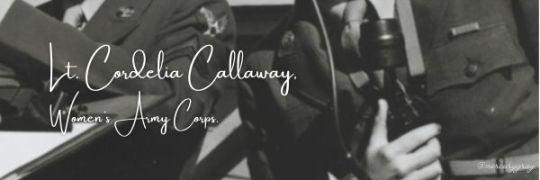
Ugh, finally! This only took me the better part of a week but I like what's here, and I hope you do, too. A huge thank you to everyone who contributed some new girls to this project - I didn't quite get them all in just yet but we've got all kinds of time.
It's 7:30 on a mission morning, and now that the flights are out, the second shift is eating breakfast.
---
It was a good thing that there weren't as many of them on a shift as the pilots, or they'd never fit at the breakfast table.
"Spare a little room there, Nina?" Cord asked, as politely as she could, looking for a space to at least put down her coffee cup.
Nina, a young woman of twenty with straw-blonde hair, nodded absentmindedly and moved her plate of toast slightly to the left to vacate a post-card sized plot of tablecloth, making no effort whatsoever to relocate the extremely large copy of Life magazine she was currently reading from the middle of the table.
Cord looked at Mae, sitting just to Nina's left, and the two women shared a small amused shrug. Nina was one of the younger girls in the group, and a lifetime spent on a big family farm in New Hampshire hadn't done a whole lot for her table manners. (And for a girl who professed to be small and shy, she sure did a lot of taking up space sometimes.)
"You not eating anything?" Mae asked, passing Cord the milk before she even had a chance to ask for it.
"I had some oatmeal before wheels up," Cord said, accepting the milk and pouring a very long dollop into her coffee, stirring calmly.
"You know, you're going to get in trouble one of these days, sneaking into that kitchen," Mae said wisely, taking a sip of her own cup.
"I'm not sneaking kisses, Mae, just a bite to eat. And none of them ever touch the oatmeal." Cord took a sip of her coffee and smiled, closing her eyes over the hot cup and cradling it in both hands. "Besides, I want to make sure I'm awake for takeoff."
"So when do you think they'll send a reporter to cover us?" Nina asked, still very deep in her magazine and a full page photospread of some WACs on bicycles, somewhere deep in the British countryside.
"Do we want that?" Netta asked, glancing at the magazine over Nina's shoulder, carefully spreading a thin layer of margarine over her toast and cutting into perfect, elegant triangles. (Everyone else tended to give the margarine a wide berth, but Netta was forever on about 'slenderizing' and no one wanted to tell her she was plenty thin already.)
"Have your name in Life Magazine so everyone at home can see it?" Ethel reached across the table for the pepper shaker and vigorously dusted her hashbrowns. "Who wouldn't? At that point you're practically famous."
"They're not going to send a reporter here, Nina. We're not interesting enough for that," Mae said with a practical smile, sitting back in her chair.
Nina looked up at Mae like the older woman had just told her they'd kicked a puppy. "We're plenty interesting! Colonel Huglin said last week we were winning the air war!"
"Not us personally, Nina," Mae specified, patient to the last. "It's more of a group effort - the whole 8th Air Force."
Nina sighed heavily and went back to mooning over her magazine photos. "They must be so brave," she said, clearly addressing the woman in the photographs. She turned over the next page in the photospread, the top image a sky white with parachutes. "I don't think I could ever do that."
Cord glanced down at the photo and shrugged. "It's not hard." Nina looked up dramatically. "Parachuting," she specified. "I've done it a couple of times. It's not hard, once you get used to it."
Ethel looked up from her potatoes. "Where did you ever jump out of an airplane, Lieutenant?"
Cord laughed. "Back home, in Dayton."
"Quit bragging, Cord," Mae said with a long-suffering grin. "Not all of us grew up with daddies in flight suits."
"Your dad's a pilot?" Nina looked impressed. "Why didn't you ever say?"
"More of an engineer," Cord specified, a little cagey. "But he's got his license - taken me up a couple of times."
"And Cord does, too," Mae revealed, having far too much being a fountain of information across the table.
Ethel put down her fork. "Now, why'd you ever sign up for this gig if you can fly?"
It was a serious question, and deserved a serious answer. Cord looked down at her coffee, considering her options. "Didn't think they'd let me get close enough to matter," she said, drumming one finger on the handle of her cup. "They only let girls fly stateside - and some transatlantic ferries. It'd be a lot of flight hours but…no action. At least here I know I'm doing some good."
"Captain Brennan, what do you think about it? " Nina flagged down the passing officer, already finished with her own breakfast and obviously on her way to her next assignment. "These gals in the paratroopers that everyone can't stop writing about."
"Like they invented joining the army," Ethel added with a disdainful huff.
Brennan, a good ten years older than the rest of the table, glanced down at the article, her eyes skating over the pictures of the women at calisthenics, and spilling parachutes, and fixing their hair. "I think it takes a great deal of courage to do something different. Combat's not something they've ever allowed women before, and that's a big change."
"Why would you even want to?"
"Because it's a challenge," Brennan said with a slim smile. "And they're women who like challenges - who want to see real change. Because if they can prove themselves out there, maybe one day the Army Air Force will let Lieutenant Callaway into a B-17." She smiled around the table and glanced down at the article. "I might not be able to do what they do, but I doubt they can do what I do, either. There's space in the army for all kinds." She glanced up at the clock. "Except anyone who wants to be late. I'd hurry along, ladies, we don't want to leave the third shift waiting for breakfast."
"Yes, Captain Brennan," came chorused from the table, and Nina finally packed up her magazine while everyone took last bites and drained coffee cups and set down napkins.
"Lieutenant Callaway." Cord stopped in her tracks. "Master Sergeant Knox said you were in the kitchen again this morning eating with the crews." She paused. "When you've all been told the ground staff eats second."
Cord looked guiltily at her commanding officer, caught out. "Yes, Captain."
Brennan's face had the slightest of smiles. "I told him that I didn't like tattle-tales, and if one of my officers wanted to make sure she was sharp for wheels up then he'd better accommodate her."
Cord let out the breath she'd been holding in, relieved as anything, and allowed herself a smile. "Yes, Captain."
Brennan nodded, implacable. "Don't miss your transport, now, they'll need you back at Tower."
Cord nodded, double-timing for the door and the waiting pair of trucks outside, ready to carry the morning crew back to their assignments.
"I told you she'd chew you out about breakfast!" Mae said quietly, as the rest of the truck chattered and gossiped while the engine idled and they all settled onto the bench seats for the five minute ride to the other side of the airfield.
"She didn't chew me out," Cord said quietly. "Told Knox I had a pass for it."
"And what do they always say about Irish luck?" Mae asked with a grin. "I want to see Knox's face the next time you do it. He'll be steamed."
"Get up at four-thirty and join me," Cord replied with a smile of her own.
Mae laughed out loud as the truck coughed into motion. "As if! A girl in this man's army's got to have her beauty sleep!"
#i have written a thing#mercurygraypresents#cordelia callaway#mae werner#nina turner#ethel murray#marion brennan#netta hallstrom#masters of the air OC#mota oc#tds cinematic universe
42 notes
·
View notes
Text
The house in Peacehaven that Tom picks out for his and Marion's retirement is tied to the Turner painting he and Patrick first connect over.
"How does it make you feel?", Patrick asks. The feelings Tom describes, "Like swimming in rough surf" and the ensuing conversation is foreshadowing for what is about to happen to their lives.
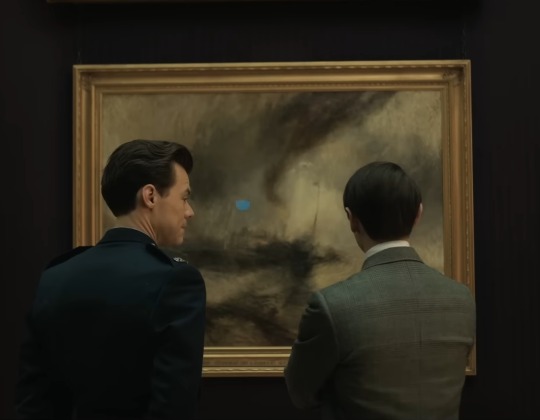
There's a reason Grandage picked this scene as the opening of the first teaser for the film.
Forty years on, Tom has chosen to live out his life in a house with a side view of the sea. The sea, with its rough waves, is a permanent feature of the house and it's the connection to his memories of Patrick.
The painting is "Snow Storm – Steam-Boat off a Harbour’s Mouth Making Signals in Shallow Water" by J.M.W. Turner, 1842. It's a (heavy handed) metaphor for the story, Tom at the center of a storm of emotions. Patrick and Marion the warring sea and storm. He is the light at the center of the storm, fighting against the waves and snow to stay afloat long enough to make it shore.
Turner belonged to the Romantic movement in art, music, and literature. Think Wordsworth, Keats, Shelley and Beethoven, Tchaikovsky, Chopin. The Romantic movement was all about emotions and individualism. Turner's style of painting to depict the movement of natural elements would go on to influence the Impressionist, Post-Impressionists, and Modernists. The Turner Prize is named after him.
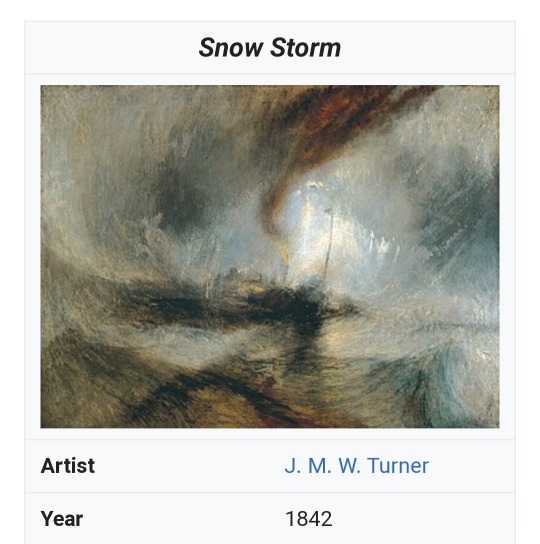
#My Policeman#Tom Burgess#Patrick Hazelwood#Marion Taylor#J.M.W.Turner#Harry Styles#Turner painting#Painting in My Policeman#3Nov2022
54 notes
·
View notes
Text
#pt. 4!!#a lot of icons this round for sure <3#*mine#mine: polls#polls!#polls#old hollywood#gene tierney#irene dunne#lucille ball#norma shearer#tallulah bankhead#joan blondell#rosalind russell#lana turner#debbie reynolds#marion davies
13 notes
·
View notes
Text
Some updates
Readers, it’s been a long time since I’ve posted on Backlots! I’ve been very busy with activities related to Captain of Her Soul, which is now out as of September 27. I wanted to share a few things I’ve been up to, and some upcoming events, so you might have some context as to why Backlots has been inactive for a while.
-Captain of Her Soul has been profiled in a beautiful article in Alta…

View On WordPress
#classic film#classic movies#marion davies#movies#San Francisco silent film festival#Silent Film#tcm#turner classic movies#updates
2 notes
·
View notes
Text
Turner Construction Company Hosting Open House in Manchester for Small and Minority Businesses
Turner Construction Company, along with partners Jesse Stutts, Inc. and Jake Marshall Service, Inc., are hosting an informational open house for local small and minority-owned trade businesses on Feb. 29. Turner and its partners are currently working on facility restoration and modernization projects supporting the Arnold Engineering Development Complex (AEDC) near Tullahoma, Tenn.
The event will…

View On WordPress
#Bledsoe County News#Chattanooga News#Dunlap News#Grundy County News#Haletown#Jasper News#Kimball News#Marion County News#Monteagle#New Hope#Pikeville#Sequatchie County News#Sequatchie Valley News#South Pittsburg News#Turner Construction#Whitwell News
0 notes
Text
Transforming an eating disorder
Lisa was a thirtyfiveyearold professional woman who had been in analysis for three years. She had gradually lost seventyfive pounds; she wanted to lose fifty more. Having devoted herself to her studies and her profession, she had never had an intimate relationship with a man. She had worked hard to free herself from her psychologically incestuous relationship to her father, and her anger toward her mother. She was no longer ashamed of her body, but the touch of a man would fill her
With terror and despair, so much so that she would freeze, rigid and inarticulate. After such incidents, she would binge. She wanted the comfort of food, the swallowing down of sweetness to combat the rising fear and rage. More than that, she was terrified to give up her big body, her shelter, her armor, her constant excuse for everything that had been denied her. Her dreams began to circle back to her early childhood, the point where she had abandoned her creative child. She was breaking out in rashes, her lower back was in constant pain. Most disconcerting was her nausea when she defiantly ate chocolate. But she was too terrified to let go.
She was moving toward a threshold. Her skin rash was telling her the old snake skin had to be sloughed off; her lower back was weary of carrying her rage; her stomach was experiencing chocolate as poison. Her dreams were asking her to go back and reclaim her abandoned creativity. She was coming up to the threshold where she might step into her own womanhood. If this threshold were missed, she might regain all the weight she had lost.
And it would have been missed had preparations not been in the making for months beforehand. She and her cultural milieu were convinced that by dieting she was moving toward her own salvation. An inner voice, however, was not convinced. "What if I do get thin, and what if life still isn't worth living? That's the last 'SO WHAT?'" There was the ultimate hurdle. She was facing the loss of the illusion that had fed her all her life. Fear could escalate into panic, panic that was hard to identify because Lisa seemed to be accomplishing exactly what she set out to do.
Preparations for the threshold were in the making, physically and psychically, as described in other chapters of this book. Here I want to focus on the terror of giving up the known body. Anyone who has not lived in a body that does not correspond to a social norm finds the anguish hard to comprehend. It is easier to understand a rich man's grief when he loses his fortune, or a socialite's dread when she becomes allergic to makeup. These people are operating within society's value system. What happens, however, to people who have never held society's values, whose physical body has forced them to develop values of their own? When others rejected it, its occupant in one way or another has taken care of it. To forsake it, without consciously dealing with the grief, is like forsaking a retarded child. Moreover, whatever the body has been, it has taken center stage in almost every decision. To lose it as an habitual preoccupation is to make room for freefloating anxiety. To be free of a compulsion is to stare into the abyss.
Nor is life in a fat body without its compensations. Whether her innate temperament, family situation or peer group rejection has created her outsize body, the fat woman has had to develop enough inner strength to walk alone, and a degree of ironic detachment that simultaneously attaches her to, and separates her from, the rest of the human race. What that does to her authentic feelings and to her body is another question, but it does give her a certain psychological strength. Secretly she may be an Artemis, the virgin huntress, wild, free and unapproachable, or she may be an Athena, the virgin idealist, sensitive, energetic, a lone leader fighting for a cause. This is the other side of the virgin—aloof, untouchable, undefiled, unawakened to her own sexuality. A fat body is the armor of Athena, the arrows of Artemis. To give it up is to become defenseless. A new whirlwind of questions rips into a consciousness accustomed to solitary pride: Do I want to join the masses? Am I remotely interested in Aphrodite's sexual intrigues? Do I want to worry about my bustline or the newest makeup? How could I commit myself to a man? Could I degrade myself with Hera's jealousy? I see the messes the Aphrodites and Heras make of their lives, and I don't think I'm so badly off. I want my freedom.
A woman at this threshold is dealing with the paradox of virginity. Part of her clings to the lower innocence of the unconscious virgin; part of her yearns for the higher innocence of the mature virgin who is confident enough to be consciously vulnerable. Incorporating the whore side of the virgin—the outcast for whom there is no room in the inn—is saying YES to the body, YES to the passions, at a level the disembodied spirit does not know. It is the pure feminine energy that allows a woman to be in love with her body; it is the energy that surges from the soles of her feet to the top of her head. Unpossessed and unpossessing, its strength is its vulnerability, vulnerable to life, to love, to otherness. It is the energy of the sacred prostitute who surrenders herself to the Goddess, allowing herself to be filled with female spirit. In sexual intercourse, the man who can surrender himself to that energy is reborn through it. Yang meets Yin, Yin meets Yang, and in the interchange both are reborn and empowered. Initiated into womanhood without losing her virginhood, the pregnant virgin gives birth to herself, to the man, and to all creation—a new world radiating with new light. Then they separate and return to their own source.
Paradoxically, accepting the higher innocence brings the body to life. The lower innocence is terrified of change, terrified of fertility and growth. Its reaction to any threshold is NO. Unless consciously dealt with, its reaction to this threshold that will take it into life is NEVER.
When Fate starts knocking on the door, in dreams and symptoms, then a ritual may evolve out of an inner demand. The sense of carrying a load that no longer needs to be carried becomes increasingly unbearable. What was, is finished; what lies ahead is unknown. Compulsive personalities do not turn energies around easily, even when they recognize that their habitual rituals have become sterile. They have immense psychic energy invested in one object or person and letting go of that, taking up a new orientation to life without substituting another false god, is no easy task. It cannot be done unless the individual recognizes that the regressive energy has become destructive and needs to be redirected into new creative outlets.
Going back into the womb to annihilate the ego is one thing; going back to attend to the seeds is another. It is the difference between infantile regression and what Jung called reculer pour mieux sauter—a step back, the better to leap forward. The walk on the tightrope between compulsion and creativity is always precarious because the source of both is the same. When the ego is vulnerable enough, in other words conscious enough and strong enough, to surrender to the healing power of the new life that is attempting to break through, then ritual naturally makes the connection. The time has to be ripe.
If the possibility of the intersection of human and divine is recognized in daily life, then ritual does not seem foreign. Older cultures always left room for the gods at the threshold and fireside, and in other parts of the home. Altars are set up in our lives whether we realize it or not, and unconscious altars encourage demonic visits. The refrigerator can be a cold altar for an icy god. Altars that are consciously set up create a container that can hold an influx of spiritual energy. One has to search for the right place in one's environment to create a sacred spot for the purpose of concentration.
When Lisa felt the right time encroaching on her, she took three days off work plus a long weekend. With very little formal knowledge of ritual, she allowed herself to do whatever was dictated from within. She stayed alone in her apartment. She took the phone off the hook. She fasted. She bathed and put on fresh clothes. She chose a sacrificial object—her beautiful mother's wedding veil which she had played with reverentially in her childhood, a veil that had effectively shrouded her from ever making a marriage of her own, free of the shackles that bound her mother. She put it on her small altar and left it there. Every time she passed it, her breath caught at the thought of losing it. She wrote in her journal for hours about what her body had meant to her, about her father, her mother, her brother. She assessed her sacrifice: her illusions of grandeur, her need to control, her proud isolation. She wept. She allowed herself to mourn for the person she had been. She cleaned out cupboards. She thought. She wrote some more. She danced. She washed and waxed the floor. Always she was circling the inevitability of allowing the infantile Lisa to die. That circling she brought to consciousness in her journal.
Can I let her die? She's dead. The truth is she is dead already. Binging doesn't give me a high anymore. It doesn't deaden the pain. It's become soul destroying, selfbetrayal, distracting me from responsibilities to myself. It forces me to face the despair of no longer respecting myself. Still, I'm trying to conquer the extremes—all or nothing. That feels like real energy.
But the terror—the terror of living with her, the terror of living without her. What now? If I go with my real feelings, I'll have to go back to university. I'll have no money. I'll have to face the interminable essays. I'll have to give up some of my friends. They'll feel betrayed. They think they know me, but they don't. We really have little in common. I'm not the person I pretend to be. I thought I was alone before. Now I'll really be alone. There won't be anybody.
And my poor body. Every time I lie on the floor it curls up in the foetal position. It goes rigid, won't let anything in. It's stubborn and resistant. It's always been this way; it's never going to be any other way. This is my fate. I've tried and tried and tried to make things happen. Nothing ever happens. I no longer expect anything to happen. It's defeat, defeat, DEFEAT.
I force my arms and legs to open. I smash the floor. I'm afraid of my own rage. What is this spasm that makes me curl up this way? I cannot stay open. I cry, but this crying is different from the other crying. This is a tiny baby that cries from its gut—heartbroken sobs. It's so alone.
What does this baby want? I can't go on hating her. My hatred makes her whine and she whines until she's hysterical. The more she whines, the more I hate her. I've got to listen to her. Whoever I am, she's part of me. Who am I? Am I old enough to be responsible for myself? I'm only 35. Do I want to be responsible?
She wrote her answers in terms of the present and compared them to the past. She painted images that called out for color and allowed them to transform in their own impetuous way. Then she was startled by a mature feminine voice that controlled her pen.
You have to decide whom you serve. Are you still accepting her death sentence? Are you still bound to the complex that tried to suck out your young life and would now try to take it away again? Decide whether what you've been writing is real or fantasy. Recognize what ground you're standing on. What Goddess are you worshipping? Are you bound by the law or are you living in the spirit? Are you going to continue in fetters or are you free? Can you step into the authenticity of your own life? Your own death? Most of what you've written no longer applies. Your responsibility now is to your new life.
Lisa tried then to hear her abandoned child's voice, and received two responses.
I am your body. My mother did not want me. I huddled in her womb as still as I could be. I was terrified of being thrown out. I survived the rupture of birth. I was unwelcomed when I got here. Had I been a boy the story might have been different. My parents gave the name they chose for me to my brother. I tried to be no bother. I was always afraid of being killed so I tried to do everything I could to be loved. I do not want to live because I am not loved. I have always been hated. Whoever it is that hates me never ceases to punish me for a crime I know nothing about. It's as if my very existence is a crime. I am punished because I exist. When I am hungry, I am not fed. When I am exhausted, I am not allowed to rest. When I need to move, I am forced to stay still. Sometimes I go wild with freedom, but I know it won't last. Whoever is doing this must hate me. But I do not know why I am hated. The punishment would stop if I ceased to exist. I am tired of being punished for a crime I never committed. I AM NOT GUILTY... No one listens to me. I want to die because I have been sentenced to life imprisonment for a crime I never committed.
Then she heard another voice:
Lisa, Lisa, hear me. You do not understand. That is the voice of my despair. I do want to live. I am your soul. When I say I don't want to live, I mean I do not want to live in this disembodied state. I do not want to live like a ghost. I mirrored your mother. I mirrored your father. They used me to see themselves. I could not enter your body because you could not endure the anguish of your mother's rejection and your father's possession of your body. She was never yours. Now you are conscious of her anguish. Together we can love her and bring her to life. I am immortal. I cannot die, but I must have a home. I must see and hear and taste and smell and feel if I am to grow.
For the first time in her life Lisa was not angry with her body. Instead, she found she had taken up residence inside and was listening to her soul from within. For her, this was an extraordinary reversal and recognition: she had walked in her shadow's shoes all her life. Her real ego she had never lived.
The rhythm of her solitary days crescendoed as she became physically more tired and psychically more conscious. Part of her was avoiding the ritual; part was moving inevitably toward it. She became what Victor Turner calls one of the "liminal entities" who
are neither here nor there; they are betwixt and between the positions assigned and arrayed by law, custom, convention, and ceremonial. As such, their ambiguous and indeterminate attributes are expressed by a rich variety of symbols in the many societies that ritualize social and cultural transitions. Thus liminality is frequently likened to death, to being in the womb, to invisibility, to darkness, to bisexuality, to the wilderness, and to an eclipse of the sun or moon.
Without quite understanding what she was doing, Lisa allowed the instincts to guide her body and the archetype to guide her psychic rhythms. Sensing their inner order and trusting it, she knew she was protected from too great and too fast an influx of spiritual energy. As she allowed the old world to go, the new was moving in. Unconscious ritual behavior associated with her compulsive eating was rechanneled into conscious awareness of what she was trying to do. This led to surrendering to the transpersonal energy that supported and directed in ways she never dreamed of.
On the fifth night, her energy had reached its zenith. She threw her ritual binging dress down the garbage chute, lit the candles and began her dance, allowing her body to circle, creating her sacred space. She had prepared her own ritual. Moving in and through and around the images of her own inner world, she arrived at the moment of sacrifice. She was subject and object—sacrificer and sacrificed. She sacrificed Lisa as she had been. She burned her ritual object, her mother's wedding veil, and in the burning she saw her own abandoned child. She took her in her arms and sat on the floor rocking her own body as she would have rocked a real baby. Then she opened her whole body to new possibility. She blew the candles out. She slept. Dawn came, not golden, but clear.
That is the bones of ritual. The transformative power of the love released cannot be articulated. Therein lies the mystery. For Lisa, being able to nourish and cherish her own spiritual child was the beginning of her own life. She as a woman was born.
Months later, she dreamed that she was looking into a starry sky. White Northern Lights began to whisk with gossamer veils from the horizon to the dome of heaven. As she looked, the veils parted and there, her head covered with stars, stood an image of Sophia, her powerful body moving with the lights, her hands sweeping her veils about her as she vanished. The sky swirled with light, and again the draperies parted and her soft feminine body sat, clothed in white samite, already evanescent among other veils, already gliding into another glimmering image.
Such an image can counterbalance a woman's derogatory feelings of her femininity as heavy, dark, stolid and earthbound. Shimmering with silver light, ever shifting, ever serene, the Goddess in the sky suggests the spiritual essence of womanhood. Refusing to be fixed, this Queen of the Night with her diadem of stars plays in and around and through the imagination, infusing darkness with light—a bridge between heaven and earth.
By nature, most addicts are involved in intercourse with the transpersonal, whether with devils or angels. If with devils, the selfdestructive drives will become evident. If with angels, their ego will sooner or later be forced to submit to the fire of transformation, in which case their greedy wolf energy can become an unquenchable lust for life, with the intelligence and power of the wolf in the service of the sungod Apollo (the god to whom the wolf belongs). Ritual demands concentration and discipline as the participant endeavors to wrestle consciousness out of unconsciousness, providing a channel for the libido lest it be lost in the instincts and the chaos of the unconscious.
The greatest threat to a successful transition is the possibility of abortion. What is sacrificed must be recognized and its loss acknowledged and mourned for as long as that may take, before final, irrevocable burial. Burial represents the conversion of subjective identification into objective facts, the separatio of the alchemical process. The possibility of outworn patterns reestablishing themselves is always present, and if they are resurrected they tend to become more stultifying and less relevant than ever. But when depths of subtlety capable of handling new and different energies are ready to be opened, grief that has hardened into despair can be unblocked and
its energy rechannelled into vital springs of renewal. This potential energy needs to be recognized immediately in order to ensure its flow.
Lisa's experience is a good example of how ritual can act as a transformer of energy. Released from her compulsive rituals, she was also released from the terror of being whirled into the vortex of the dark side of the mother. Through her human endeavor, she brought herself to a point of submission, a vacuum, a womb ready to be fertilized by the spirit, ready to bring forth the transforming image. Using her knowledge of yoga, she stretched her whole Being that extra stretch, then released and allowed the new energy in. By going with her body to its farthest extension and letting go, by going with her psyche to its farthest extension and letting go, she
cooperated with nature and spirit in allowing herself to be born. Her sacrifice released her forgiveness: loving her body, formerly seen as her enemy, she recognized it for what it was, her friend. Through her wounded body, her abandoned soul was returned to her. Through her wound, she became conscious of her inner virgin.
--Marion Woodman en "The pregnant virgin"
0 notes
Text
SLED CHARGES TWO PEOPLE IN MARION COUNTY WITH GAMBLING ANDUNLAWFUL POSSESSION OF GAMBLING MACHINES
Agents with the South Carolina Law Enforcement Division (SLED) arrested Brenda Turner, 74, and Danny Ray Turner, 74, on Wednesday, July 12, 2023. Both were charged with Gambling and 7 counts of Unlawful Possession/Operation of a Gambling Device.Details can be found in the attached warrants.Brenda Turner and Danny Turner were booked at the Marion County Detention Center.The case will be prosecuted…

View On WordPress
0 notes
Text
Some updates
Readers, it’s been a long time since I’ve posted on Backlots! I’ve been very busy with activities related to Captain of Her Soul, which is now out as of September 27. I wanted to share a few things I’ve been up to, and some upcoming events, so you might have some context as to why Backlots has been inactive for a while.
-Captain of Her Soul has been profiled in a beautiful article in Alta…

View On WordPress
#classic film#classic movies#marion davies#movies#San Francisco silent film festival#Silent Film#tcm#turner classic movies#updates
1 note
·
View note
Text
“[Shakespeare’s The Merry Wives of Windsor] declined in popularity in the nineteenth and twentieth centuries: as Phyllis Rackin points out, it is a fascinating comment on twentieth-century taste that this comedy about virtuous female power and ability lost favour while the disturbing Taming of the Shrew, which highlights (perhaps approvingly) the abuse of women grew to be more liked than ever before.”
Excerpt from Marion Turner’s The Wife of Bath: A Biography, chapter 7 “When Shakespeare Met Alison”
2 notes
·
View notes
Text

Ava Gardner and Lana Turner at Marion Davies' party, Modern Screen, July 1953
147 notes
·
View notes
Text
Walker episode 2 review
Cordell, Trey, and Cassie find themselves watching over the episode’s titular character, Maybelline Pratt, a state witness in a money laundering case. Maybeline has the charm of all 4 Golden Girls characters as well as their combined age. Like Sophie Petrillo, she gave Trey the slip and tried to hotwire a patrol car with a wrench, because that’s how they do in Sicily. Like Blanche Devereaux, she loves flirting with Trey even as they take turns running away from each other. Like Dorothy Zbonak, she is full of judgment stares and sass and keeps calling Cordell by the wrong surname. Rangers over the age of 50 are smitten with her because every red-blooded male that grew up in the 70s and 80s fell in love with Karen Allen and Kathleen Turner and their smokey voices. Harrison Ford to this day can’t stand Indiana Jones fanboys approaching him to only want to talk about Marion Ravenwood and “that voice”.
Maybelline has the Rose Nylund naivety thinking she can just go back to St. Olaf and carried a metal file in her oversized purse to escape from WITSEC. Cordell decided one of them need to take her home. Trey and Cassie were “not it” and Cordell reluctantly take her to Walker ranch while the 2 security officers assigned to her secure the area. Maybelline soften her attitude towards Cordell when she sees family pictures and learn of Emily’s passing. Later in the middle of the night, Cordell finds Maybelline having “just to taste” bourbon at the dinner table and the two have a heart to heart over Cordell’s worry over his children leaving the nest.
“The days are long, but the years are short”, Maybelline tells Cordell, and while children appear not to listen, they are always watching. The fact that Stella and August feel comfortable enough to leave home just means he (and Emily) did a good job raising them, and they’ll likely come back one day. Just like Cordell and Liam did.
Cordell found it easier to talk to a stranger about his anxiousness over being ill prepared for "the quiet" once his kids are gone. Stella too, found it easier to talk to Ben about her guilt over Witt’s death and had even shut Liam out. In attempt to make peace with her conflicting conscious, she visits a roadside memorial where Witt succumbed to his gun shot injury. Unexpectantly Witt’s uncle, Mike, shows up and seems kind, which made Stella feel worse and she flees. Then Mike ominously calls someone to say he found something “interesting”. Looks like there will be a second mystery to go with the unsolved Jackal case as we never learn why Witt broke into Geri’s house. Speaking of which…
Cassie had updated Geri (and us) that she decided to return to the Texas Rangers. Later Geri offers Cassie to move into her house, referencing the break in that it would be a good idea to have a ranger around. While Cassie is thrilled and accepted Geri’s offer, you know that Cordell would be worried about their girl talks. At least I would be.
Cordell, Trey, and Cassie brings Maybelline to court to give her testimony only to walk right into a trap to distract them so that the baddies can kidnap Maybelline. Cue lively soundtrack as a car chase through the parking garage to rescue Maybelline ends in beat down fights by Cordell and Trey. Maybelline bats her Blanche Devereaux lashes at Trey for saving her. Cordell insists it was a team effort.
At home, Cordell waits for August to discuss the issue of him wanting to join an after school boot camp to ready himself for the military, but he needs a signed permission slip from his father. Earlier August asked Bonham to go over Cordell’s head and convince Trey, who is running the program, to let him join. In the season 3 finale, Cordell wouldn’t give his permission to let August join the military while he is underage. When Bonham tries to broach the subject with Cordell, he immediately shuts it down because he wants to put off of August growing up as long as he can. But after his midnight conversation with Maybelline, Cordell is ready to have a talk with August.
Cordell explains that while he has no regret over his own tour in the military, he can’t help wondering if he missed out on other options and he doesn’t want that for August. But, if this is really what August wants, he'll be supportive, no matter how much he'll worry over his “only son” and “baby boy”. August is thrilled and promised to follow Cordell’s condition that he is present for every Sunday dinner and keep up his schoolwork. A flashback scene from the pilot episode shows Cordell telling a 14-year-old August he didn't mean for his son to grow up quickly after his mother's death, adding to Cordell’s bittersweet demeanor.
We have "the quiet" before the storm with Cordell, Liam, Ben, and Stella having fun together playing darts at the Side Step. Stella returns to her dorm to find a threatening message on the window written in red paint.
Speculation #2: Witt didn't die from his gunshot wound and was murdered on the roadside by the same person who left the threatening message to Stella.
Score: 9 out of 10. What started out a light-hearted episode ends with a horror movie jump scare, a kind of metaphor for parental struggle and angst.

artist
39 notes
·
View notes
Text
G’eth Character Name Bank
First Names
Masculine Names
Alfred, Andrew, Arlo, Arthur, Balthazar, Barry, Ben, Benedick, Bernard, Burchard, Cedric, Charibert, Crispin, Cyrill, Daegal, Derek, Digory, Drustan, Duncan, Edmund, Edwin, Elric, Evaine, Frederick, Geffery, George, Godfreed, Gregory, Guy, Harris, Harry, Horsa, Hugh, Humphrey, Iago, Jack, Jeremy, John, Kazamir, Kenric, Lawrence, Leoric, Lorik, Luke, Lynton, Lysander, Madoc, Magnus, Maukolum, Micheal, Miles, Milhouse, Mordred, Mosseus, Ori, Orvyn, Neville, Norbert, Nycolas, Paul, Percival, Randulf, Richard, Robert, Roderick, Stephen, Tennys, Theodoric, Thomas, Tristan, Tybalt, Victor, Vincent, Vortimer, Willcock, Willian, Wymond
Feminine Names
Adelin, Alice, Amelia, Beatrix, Beryl, Bogdana, Branwyne, Brigida, Catalina, Catherine, Claudia, Crystina, Deanna, Desdemona, Elaine, Elinora, Eliza, Enide, Eva, Ferelith, Fiora, Freya, Gertrude, Gregoria, Gueanor, Gwen, Gwendolyn, Hannah, Hegelina, Helen, Helga, Heloise, Henrietta, Igraine, Imogen, Jacquelyn, Jane, Jean, Jenny, Jill, Juliana, Juliet, Katie, Leela, Lettice, Lilibet, Lilith, Lucy, Luthera, Luz, Lyra, Malyna, Margherita, Marion, Meryl, Millie, Miranda, Molle, Morgana, Morgause, Nezetta, Nina, Novella, Olwen, Oriana, Oriolda, Osanna, Pamela, Petra, Philippa, Revna, Rohez, Rosalind, Rose, Sallie, Sarra, Serphina, Sif, Simona, Sophie, Thomasine, Tiffany, Ursula, Viola, Winifred, Yrsa, Ysabella, Yvaine, Zelda, Zillah
Gender-Neutral/Unisex Names
Adrian, Alex, Aiden, Arden, Ariel, Auden, Avery, Bailey, Blaire, Blake, Brett, Breslin, Caelan, Cadain, Cameron, Charlie, Dagon, Dana, Darby, Darra, Devon, Drew, Dylan, Evan, Felize, Fenix, Fernley, Finley, Glenn, Gavyn, Haskell, Hayden, Hunter, Jace, Jaime, Jesse, Jo, Kai, Kane, Karter, Kieran, Kylin, Landon, Leslie, Mallory, Marin, Meritt, Morgan, Nell, Noel, Oakley, Otzar, Paris, Peregrine, Quant, Quyn, Reagan, Remy, Robin, Rowan, Ryan, Sam, Samar, Sasha, Sloan, Stace, Tatum, Teegan, Terrin, Urbain, Vahn, Valo, Vick, Wallace, Waverly, Whitney, Yardley, Yarden, Zasha
Surnames
Surnames, Patrilineal - First Name (Patrilineal Surname)
Ace, Allaire, Appel, Arrow, Baker, Bamford, Barnard, Beckett, Berryann, Blakewood, Blanning, Bigge, Binns, Bisby, Brewer, Brickenden, Brooker, Browne, Buller, Carey, Carpenter, Carter, Cheeseman, Clarke, Cooper, Ead, Elwood, Emory, Farmer, Fish, Fisher, Fitzroy, Fletcher, Foreman, Foster, Fuller, Galahad, Gerard, Graves, Grover, Harlow, Hawkins, Hayward, Hill, Holley, Holt, Hunter, Jester, Kerr, Kirk, Leigh, MacGuffin, Maddock, Mason, Maynard, Mercer, Miller, Nash, Paige, Payne, Pernelle, Raleigh, Ryder, Scroggs, Seller, Shepard, Shore, Slater, Smith, Tanner, Taylor, Thatcher, Thorn, Tilly, Turner, Underwood, Vaughan, Walter, Webb, Wilde, Wood, Wren, Wyatt, Wynne
Surnames, Townships in G’eth - First Name of (Location)
Abelforth, Argent Keep, Barrow Springs, Barrowmere, Bedford, Brunhelm, Bumble, Casterfalls, Dunbridge, Falmore Forest, Folk’s Bounty, Frostmaid, Fulstad, Heller’s Crossing, Hertfordshire, Humberdale, Inkwater, Little Avery, Marrowton, Mistfall, Mistmire, Morcow, Necropolis-on-Sea, Otherway, Parsendale, Piddlehinton, Port Fairwind, Redcastle, Ransom, Rutherglen, Saint Crois, Tanner’s Folly, Tavern’s Point, Wilmington
Surnames, Geographical Locations in G’eth - First Name of the (Location)
Cove of Calamity, Deep Woods of Falmore, Eastern Isles, Eastern Mountains, Foothills, Frozen Peak, Lakes, Maegor Cobblestones, Northern Mountains, Southern Isle, Tangle, West Coast, Wild Wild Woods, Woods of Angarad
Surnames, Nickname - First Name the (Something)
Bald, Bastard, Bear, Bearded, Big, Bird, Bold, Brave, Broken, Butcher, Bruiser, Careless, Caring, Charitable, Clever, Clumsy, Cold, Confessor, Coward, Crow, Cyclops, Devious, Devoted, Dog, Dragonheart, Dreamer, Elder, Faithful, Fearless, Fey, Fool, Friend, Generous, Giant, Goldheart, Goldfang, Gouty, Gracious, Great, Hag, Handsome, Hawk, Honest, Huge, Humble, Hungry, Hunter, Innocent, Ironfist, Ironside, Keeper, Kind, Lesser, Liar, Lionheart, Little, Loyal, Magical, Mercenary, Merchant, Messenger, Old, Orphan, Pale, Polite, Poet, Poor, Prodigy, Prophet, Proud, Reliable, Romantic, Rude, Selfish, Sellsword, Scab, Scholar, Shield, Shy, Singer, Sirrah, Slayer, Slug, Small, Stoneheart, Swift, Tadde, Talented, Tart, Tenacious, Timid, Tiny, Tough, Traveller, Trusted, Truthful, Viper, Wizard, Wolf, Wyrm
106 notes
·
View notes
Text

Dustin Ingram as Carl Perkins, Christian Lees as Jerry Lee Lewis, Kevin Fonteyne as Johnny Cash, Drake Milligan as Elvis Presley and Kerry Holliday as Ike Turner in "Sun Records"
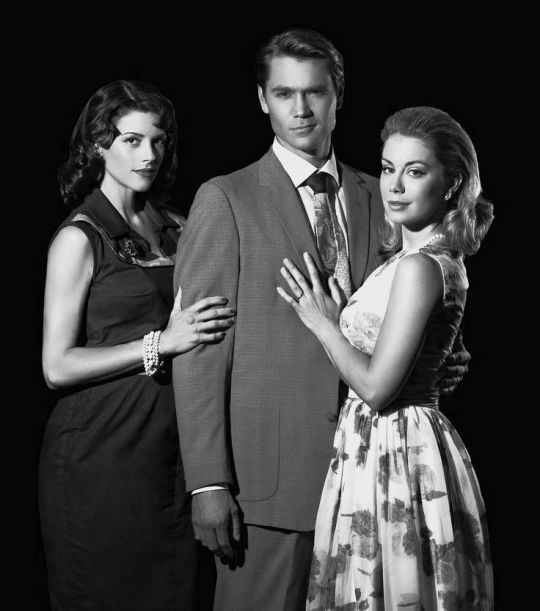
Margaret Anne Florence as Marion Keisker, Chad Michael Murray as Sam Phillips and Jennifer Holland as Becky Phillips in "Sun Records"
#Sun Records#TV#Dustin Igram#Christian Lees#Kevin Fonteyne#Drake Milligan#Kerry Holliday#Margaret Anne-Florence#Chad Michael Murray#Jennifer Holland
14 notes
·
View notes
Text


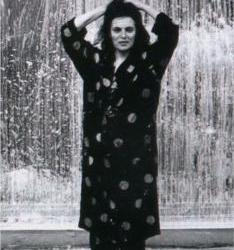


Pat Steir (born 1940) is an American painter and printmaker. Her early work was loosely associated with Conceptual Art and Minimalism, however, she is best known for her abstract dripped, splashed and poured “Waterfall” paintings, which she started in the 1980s, and for her later site-specific wall drawings.
"Over the course of her education at the Pratt Institute and then the Boston University College of Fine Arts, Pat Steir studied under Philip Guston and Richard Lindner. She first worked as an illustrator, graphic designer, and became friends with well-known conceptual artists such as Sol LeWitt, Lawrence Weiner, and others. Her meeting with Agnes Martin (1912-2004) left a deep impression on her, and as a result she turned to a brand of abstraction that did not exclude reality. Apart from her pictorial practice, she also worked in publishing: from very early on, she was hired by feminist magazines, including Heresies and Semiotext(e).
Her paintings act as an inquiry into the nature of painting itself. She creates series focused on landscapes and self-portraits that she periodically revisits. For example, Waves and Waterfalls (1982-1992), Summer Moon (2005), Gold and Silver Moon Beam (2006), Water & Stone (2010), are nods to the landscapes of Courbet, Turner, and Hokusai. Their numerous vertical lines, produced by as many evenly-spaced drips, echo Jackson Pollock’s dripping technique. In the famous Waterfalls series, the artist dilutes the oil paint, which streams down from the top of the painting to the ground. About Steir’s self-portraits, Denys Zacharopoulos wrote: “Self-Portrait is not a painting and does not depict a face, her face in any kind of way. This plural expression, reversible, equivocal, changing, at one with time, proliferates into an infinity of others in space, her shape-shifting and mercurial being, both enveloping and enveloped, is the “self-portrait (Pat Steir, 1990)”.
Marion Daniel
Translated from French by Toby Cayouette.
25 notes
·
View notes